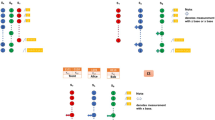Abstract
How to achieve effective authentication, secure and efficient information transmission of users in different domains are research hotspots in cross-domain communication. In this paper, we proposed an authenticated controlled quantum dialogue protocol based on three-particle GHZ-like states in a cross-domain setting. Controlled quantum dialogue means that the communication between the two communicators needs to be controlled by a third party, and the safe exchange of the secret information of the communicators in a cross-domain setting is achieved with the control of the servers. The GHZ-like states can be used to achieve communicator-to-server authentication and mutual authentication between communicators. Additionally, based on the measurements of the GHZ-like states, two communicators obtain the same key. The proposed protocol has a feasible qubit efficiency of 50%, which can effectively resist external attacks and internal server attacks.

Similar content being viewed by others
Data Availability
The authors confirm that the data supporting the findings of this study are available within the article.
References
Ri-Gui Zhou, Xiao-Xue Zhang, Feng-Xin Li.:Three‑party semi‑quantum protocol for deterministic secure quantum dialogue based on GHZ states. Quantum Inf. Process. 20(4), 153 (2021)
MalhotraIshika Giroti, Meenakshi Malhotra. Quantum Cryptography: A Pathway to Secure Communication. 2022 6th International Conference on Computation System and Information Technology for Sustainable Solutions (CSITSS), Bangalore, India, pp. 1–6 (2022)
Harshita Jasoliya, Kaushal Shah.:An Exploration to the Quantum Cryptography Technology. 2022 9th International Conference on Computing for Sustainable Global Development (INDIACom), New Delhi, India, pp. 506–510 (2022)
Gowri T Sridhar, Ashwini P, Nikhath Tabassum.: A Review on Quantum Communication and Computing . 2023 2nd International Conference on Applied Artificial Intelligence and Computing (ICAAIC), Salem, India, pp. 1592–1596 (2023)
Cheeranjiv Pandey, Sanidhya Gupta, Rimon Ranjit Das, et al.: Quantum Network Coding and Distribution of Maximally Entangled States in Measurement-Based Quantum Computing. 2023 National Conference on Communications (NCC), Guwahati, India, pp. 1–6 (2023)
Nagaraj G., Niraj Upadhayaya, Atheer Matroud, et al.: A Detailed Investigation on Potential Impact of Quantum Computing on Improving Artificial Intelligence. 2023 International Conference on Innovative Data Communication Technologies and Application (ICIDCA), Uttarakhand, India, pp. 447–452 (2023)
Ye, T.-Y.: Quantum Dialogue Without Information Leakage Using a Single Quantum Entangled State [J]. Int. J. Theor. Phys. 53(11), 3719–3727 (2014)
Jian-Hong Shi, Lan Zhou, Wei Zhong, et al.: Measurement-Device-Independent Three-party Quantum Secure Direct Communication Based on Entanglement Swapping [C]. 2022 14th International Conference on Wireless Communications and Signal Processing (WCSP), Nanjing, China, pp. 01–08 (2022)
Ze-Zhou Sun, Dong Pan, Dong Ruan, et al.: One-Sided Measurement-Device-Independent Practical Quantum Secure Direct Communication. J. Lightwave Technol., 2023, pp. 1–11, doi: https://doi.org/10.1109/JLT.2023.3244880.
Xiao-yi Zheng, Chang Kuang, Wen-zhen Liang. Controlled quantum dialogue with authentication protocol on a basis of GHZ-like state. Quantum Inf. Process., 19(8), 251 (2020)
Ba An Nguyen: Quantum dialogue [J]. Phys. Lett. A 328(1), 6–10 (2004)
Shi, G.-F.: Bidirectional quantum secure communication scheme based on Bell states and auxiliary particles [J]. Optics Communications 283(24), 5275–5278 (2010)
Ye, T.-Y.: Large Payload Bidirectional Quantum Secure Direct Communication Without Information Leakage. Int. J. Quantum Inf. 11(5), 1350051 (2013)
Chang, C.-H., Luo, Y.-P., Yang, C.-W., et al.: Intercept-and-resend attack on controlled bidirectional quantum direct communication and its improvement [J]. Quantum Inf. Process. 14(9), 3515–3522 (2015)
Amit Kumar Mohapatra, S.: Balakrishnan. Controller-independent bidirectional quantum direct communication. Quantum Inf. Process., 16(6), 147 (2017)
Hong-Ming, P.: Controlled bidirectional quantum secure direct communication with six-qubit entangled states. Int. J. Theor. Phys. 60(8), 2943–2950 (2021)
Ye, T.-Y.: Robust quantum dialogue based on the entanglement swapping between any two logical Bell states and the shared auxiliary logical Bell state. Quantum Inf. Process. 14(4), 1469–1486 (2015)
Ye, T.-Y.: Fault-tolerant authenticated quantum dialogue using logical Bell states. Quantum Inf. Process. 14(9), 3499–3514 (2015)
Pan, H.-M.: Controlled Quantum Dialogue with Five-Qubit Entangled States. Int. J. Theor. Phys. 60(9), 3460–3466 (2021)
Zhu, H.-F., Zhang, Y.-L.: An Authenticated Quantum Dialog Protocol with Three-Particle Entangled States Using Subset of Intersection Method [J]. Int. J. Theor. Phys. 59(9), 2795–2806 (2020)
Zhi-Hao Liu, Han-Wu Chen.: Cryptanalysis and improvement in controlled quantum dialogue using cluster states. Quantum Inf. Process., 18(4), 98 (2019)
Kao, S.-H., Hwang, T.: Controlled quantum dialogue robust against conspiring users. Quantum Inf. Process. 15(10), 4313–4324 (2016)
Man, Z.-X., Xia, Y.-J.: Controlled Bidirectional Quantum Direct Communication by Using a GHZ State. Chin. Phys. Lett. 23(7), 1680 (2006)
Shih-Hung Kao, Tzonelih Hwang.: Controlled quantum dialogue using cluster states. Quantum Information Processing, 16(5), 139 (2017)
Bing-Xin Liu, Xiang-Qian Liang.: Novel Controlled Quantum Dialogue Protocols Without Information Leakage. Int. J. Theor. Phys., 61(3), 51 (2022)
Zhou, X.-T., Jiang, Y.-H.: Quantum secure direct communication scheme with identity authentication. Acta Physica Sinica 72(2), 020302 (2023)
Cabello, A.: Quantum key distribution in the Holevo limt. Phys. Rev. Lett. 85(26), 5635–5638 (2000)
Acknowledgements
This work was supported by the Chongqing Municipal Education Commission Science and Technology Research Program Youth Projects (Grant No. KJQN202302401; Grant No. KJQN202202401).
Author information
Authors and Affiliations
Contributions
Chao-nan Wang contributed to the conception of the study; Chao-nan Wang wrote the main manuscript text; Hong-feng Zhu helped perform the analysis with constructive discussion; All authors reviewed the manuscript.
Corresponding author
Ethics declarations
Competing Interests
The authors declare no competing interests.
Conflict of Interest
The authors declared that they have no conflicts of interest to this work.
Additional information
Publisher's Note
Springer Nature remains neutral with regard to jurisdictional claims in published maps and institutional affiliations.
Rights and permissions
Springer Nature or its licensor (e.g. a society or other partner) holds exclusive rights to this article under a publishing agreement with the author(s) or other rightsholder(s); author self-archiving of the accepted manuscript version of this article is solely governed by the terms of such publishing agreement and applicable law.
About this article
Cite this article
Wang, C., Zhu, H. An Authenticated Controlled Quantum Dialogue Protocol Using Double-Linked GHZ-Like States in Cross-domain Setting. Int J Theor Phys 62, 211 (2023). https://doi.org/10.1007/s10773-023-05451-4
Received:
Accepted:
Published:
DOI: https://doi.org/10.1007/s10773-023-05451-4




